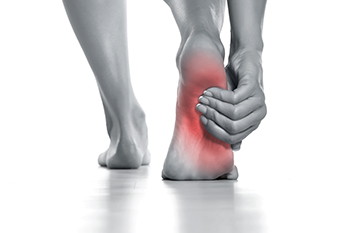
As we age, the feet naturally undergo changes that can affect comfort, mobility, and overall health. Common changes include thickened or discolored toenails, joint stiffness, thinning skin, and reduced fat padding on the soles. Circulation may also decline, leading to cooler feet or changes in color, such as bluish or reddish tones. These changes can make walking more difficult and increase the risk of falls or injury. Joint stiffness may indicate arthritis, while numbness or tingling could be a sign of nerve issues or diabetes. Thickened toenails and dry skin can also make self-care harder and lead to infections. A podiatrist can evaluate these symptoms with a physical exam, medical history, and diagnostic tests to identify underlying conditions. Treatment may include custom orthotics, targeted exercises, nail care, or recommendations for supportive footwear. If you are noticing changes in your feet, it is suggested that you make an appointment with a podiatrist for evaluation and treatment.
Proper foot care is something many older adults forget to consider. If you have any concerns about your feet and ankles, contact Brandon M. Zuklie, DPM from New Jersey. Our doctor can provide the care you need to keep you pain-free and on your feet.
The Elderly and Their Feet
As we age we start to notice many changes in our body, but the elder population may not notice them right away. Medical conditions may prevent the elderly to take notice of their foot health right away. Poor vision is a lead contributor to not taking action for the elderly.
Common Conditions
- Neuropathy – can reduce feeling in the feet and can hide many life-threatening medical conditions.
- Reduced flexibility – prevents the ability of proper toenail trimming, and foot cleaning. If left untreated, it may lead to further medical issues.
- Foot sores – amongst the older population can be serious before they are discovered. Some of the problematic conditions they may face are:
- Gouging toenails affecting nearby toe
- Shoes that don’t fit properly
- Pressure sores
- Loss of circulation in legs & feet
- Edema & swelling of feet and ankles
Susceptible Infections
Diabetes and poor circulation can cause general loss of sensitivity over the years, turning a simple cut into a serious issue.
If you have any questions please feel free to contact our offices located in Piscataway, Jamesburg, and Branchburg, NJ . We offer the newest diagnostic and treatment technologies for all your foot and ankle needs.

Heel pain is a common issue that can affect people of all ages. It often develops from overuse, wearing poor footwear, or pressure on the heel, over time. One frequent cause is plantar fasciitis, or irritation of the tissue that supports the arch, which can create sharp pain with the first steps in the morning or after resting. Other possible sources include inflammation of the heel pad, nerve involvement, or structural issues such as high or low arches. Rest, stretching, and supportive shoes may ease discomfort in many cases. However, if the pain persists, worsens, or begins to interfere with walking, it should not be ignored. Left untreated, heel pain can become more difficult to manage. If you are experiencing ongoing discomfort in your heel, it is suggested that you see a podiatrist for a diagnosis and a care plan designed to restore comfort and function.
Many people suffer from bouts of heel pain. For more information, contact Brandon M. Zuklie, DPM of New Jersey. Our doctor can provide the care you need to keep you pain-free and on your feet.
Causes of Heel Pain
Heel pain is often associated with plantar fasciitis. The plantar fascia is a band of tissues that extends along the bottom of the foot. A rip or tear in this ligament can cause inflammation of the tissue.
Achilles tendonitis is another cause of heel pain. Inflammation of the Achilles tendon will cause pain from fractures and muscle tearing. Lack of flexibility is also another symptom.
Heel spurs are another cause of pain. When the tissues of the plantar fascia undergo a great deal of stress, it can lead to ligament separation from the heel bone, causing heel spurs.
Why Might Heel Pain Occur?
- Wearing ill-fitting shoes
- Wearing non-supportive shoes
- Weight change
- Excessive running
Treatments
Heel pain should be treated as soon as possible for immediate results. Keeping your feet in a stress-free environment will help. If you suffer from Achilles tendonitis or plantar fasciitis, applying ice will reduce the swelling. Stretching before an exercise like running will help the muscles. Using all these tips will help make heel pain a condition of the past.
If you have any questions please contact our offices located in Piscataway, Jamesburg, and Branchburg, NJ . We offer the newest diagnostic and treatment technologies for all your foot and ankle needs.

Peripheral artery disease, or PAD, which reduces blood flow to the feet due to narrowed arteries, is often caused by fatty deposits known as atherosclerosis. When circulation to the lower limbs is restricted, people may experience cold feet, skin color changes, slow-healing wounds, or painful cramping while walking. Over time, symptoms of peripheral artery disease can progress and may lead to serious complications, including ulcers or tissue damage. Hair loss on the feet and slow-growing toenails are other indications of poor circulation. People with diabetes, high blood pressure, or a history of smoking are at a higher risk of developing PAD. A podiatrist may detect reduced pulses, temperature differences, or other signs during a foot exam and can recommend diagnostic testing, such as an ankle-brachial index. If PAD is identified early, a podiatrist may suggest medical treatment, and, in severe cases, surgery to restore blood flow and prevent further damage. If you are experiencing symptoms of peripheral artery disease, it is suggested that you schedule an appointment with a podiatrist for appropriate treatment options.
Peripheral artery disease can pose a serious risk to your health. It can increase the risk of stroke and heart attack. If you have symptoms of peripheral artery disease, consult with Brandon M. Zuklie, DPM from New Jersey. Our doctor will assess your condition and provide you with quality foot and ankle treatment.
Peripheral artery disease (PAD) is when arteries are constricted due to plaque (fatty deposits) build-up. This results in less blood flow to the legs and other extremities. The main cause of PAD is atherosclerosis, in which plaque builds up in the arteries.
Symptoms
Symptoms of PAD include:
- Claudication (leg pain from walking)
- Numbness in legs
- Decrease in growth of leg hair and toenails
- Paleness of the skin
- Erectile dysfunction
- Sores and wounds on legs and feet that won’t heal
- Coldness in one leg
It is important to note that a majority of individuals never show any symptoms of PAD.
Diagnosis
While PAD occurs in the legs and arteries, Podiatrists can diagnose PAD. Podiatrists utilize a test called an ankle-brachial index (ABI). An ABI test compares blood pressure in your arm to you ankle to see if any abnormality occurs. Ultrasound and imaging devices may also be used.
Treatment
Fortunately, lifestyle changes such as maintaining a healthy diet, exercising, managing cholesterol and blood sugar levels, and quitting smoking, can all treat PAD. Medications that prevent clots from occurring can be prescribed. Finally, in some cases, surgery may be recommended.
If you have any questions, please feel free to contact our offices located in Piscataway, Jamesburg, and Branchburg, NJ . We offer the newest diagnostic and treatment technologies for all your foot care needs.

